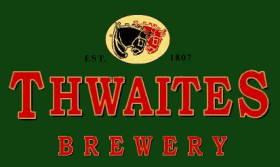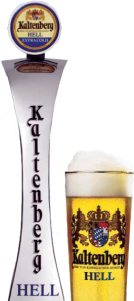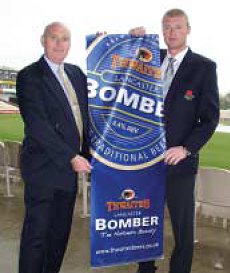| |
Thwaites of Blackburn
by Willard Clarke, 08/06
When I told a fellow journalist I was off to Blackburn to visit Thwaites, he raised an eyebrow and muttered, "Ah, the sleeping giant." I've got news for him: the giant of the north is wide awake and flexing his muscles.
Daniel Thwaites, an excise officer, founded the company: he clearly had a liking for the liquor he taxed. Thwaites today is a public company but the family controls
60 per cent of the shares and descendants of Daniel are in the ascendancy, with Anne Yarburgh as chairman and John Yarburgh as president. Mrs Yarburgh plays an active role and is a force to be reckoned with.
It's a common southern mistake to assume
|
|

|
that nothing of any note in the beer world happens beyond Manchester. But in the large conurbations of Lancashire, including not only Blackburn but Accrington, Blackpool, Fleetwood, Lancaster, Preston and the towns and villages in between, pubs and clubs serve local beer and much of it comes from Thwaites, a mighty regional that will celebrate 200 years of brewing in 2007.
"Below the Yarburghs, we are the hired hands," managing director Brian Hickman (below, left) laughs. His "hands" are impressive. Brian himself learned the brewing and pub business with Allied Breweries in Leeds, Warrington and Wrexham before joining Thwaites, while Ian Hawkins, the group finance director, and Brian Jenkins, sales and marketing director, have equally solid backgrounds in brewing, pubs and hotels: Ian is also the MD of Shire Hotels, a separate division within the group.

|
|
It's a large business, one of the biggest regional breweries in the country. It owns 422 pubs - of which 380 are tenanted - and has twice that number of free trade accounts with pubs and clubs. It sells beer not only in the North-west but in Yorkshire, the Midlands and Wales.
And it is growing. It brews a total of 320,000 barrels of beer a year. 110,000 barrels go to the free trade, an amount that has doubled over the past 15 years.
"We are a big supplier to the club trade," Brian Hickman says. "But we are also a classic vertically-integrated brewery and that is our bedrock. We are growing geographically. We have bought 28 pubs in the
Barnsley and Sheffield areas and we now see ourselves as a Northern brewer, not just a Lancashire one.
|
"We would like to push further into north Wales and the North-east but property prices are a bar to expansion. We bought 12 pubs in the last financial but our aim is 20 new pubs a year."
Thwaites brews 90,000 barrels a year for its tied estate. The rest of the annual production is made up of contract brewing in cask, keg, bottle and can. It bought the Brakspear bottling line when the Henley brewery closed and is now producing filtered packaged beers and will package bottle-fermented beers for micros.
Thwaites is a restless giant, determined to build its tied and free trade accounts, and to keep its brewery going full bore. It covers all the bases, producing beer in cask, keg, lager and smooth versions. The company prides itself on supplying the needs of all its customers and doesn't need to offer the national brands of the global brewers.
Its portfolio includes beers from the renowned Bavarian brewer Crown Prince Luitpold of Kaltenberg. Thwaites brews his Pils under licence and imports his celebrated wheat beer. It also imports one of Germany's biggest-selling lager beers, Warsteiner.
Perhaps the reason why Thwaites acquired the "sleeping giant" image was that the company seemed to lose its way in the 1990s. It went heavily down the nitro-keg route, which led to strained relations with Camra, the Campaign for Real Ale. But that is now a thing of the past and Thwaites is once again seriously promoting and building its cask brands. Relations with Camra have been restored and Brian Jenkins was well received as the guest speaker at the campaign's annual conference in Blackpool in April.
|
|

|
"We see a huge future in cask," he says. "It's the point of difference that gets people back into pubs. We've made a big investment in Original and Lancaster Bomber. We make no apologies for going into nitro-keg in the 1990s. The free trade is very different in the north because of the dominance of clubs."
He is blunt about the problems Thwaites faced in clubs. "We were murdered by John Smiths Smooth," he admits. "We now target cask and smooth beers more carefully at clubs and free trade pubs. There's a more positive attitude towards cask beer among consumers and we would consider supplying it to clubs if the volumes are there."
Getting the balance right is clearly important when you consider that of the 110,000 barrels of free trade beer brewed by Thwaites every year, 90,000 barrels goes to the club sector. The brewery has developed a new keg beer, Daniel's, a premium blond ale, especially for smaller clubs and free trade pubs.
Cask beer accounts for 10 per cent of Thwaites' annual production, around 30,000 barrels. Sales are growing impressively and the growth has been fuelled by the success of Lancaster Bomber. A sponsorship deal with England cricket tyro Andrew Flintoff has done sales of Bomber no harm. The beer was first brewed by Mitchells of Lancaster. When the company left brewing to run pubs, it leased the beer to Thwaites and receives a royalty in return.
The cask range includes Dark Mild - a delicious beer hard to find on handpump and mainly sold in keg form - Original, Thoroughbred and Lancaster Bomber. The 3.6 per cent Original has been the cask mainstay of Thwaites' tied estate and is still the biggest brand but, as Brian Jenkins admits, it didn't do especially well in the free trade.

|
|
"It was too weak for a guest beer," he says. "It wasn't on the radar. Lancaster Bomber, which we've had for more than two years, fits that market at 4.4 per cent. We're six years behind other brewers in the premium sector but we're catching up fast and the Flintoff promotion certainly helps."
The company spends �1 million a year on grassroots sports sponsorship. This includes branded shirts for Lancashire cricketers at Old Trafford and other cricket promotions. Bomber is central to this marketing.
Thwaites is also dabbling its toes in the tricky waters of branded glasses - tricky because so many go missing - for Bomber, Daniel's and the Kaltenberg brands. (Left: Freddie Flintoff receives the Grassroots sports personality award from
Thwaites Marketing Director Brian Jenkins).
|
Head brewer Steve Fielding showed me round his traditional tower brewery - where on successive storeys water, malt and hops feeds mash tuns, coppers and fermenters - that has been adapted for modern needs, able to make ales and lagers in cask, keg and nitro- keg versions. Steve produces four brews a day from two different streams, each brew accounting for 360 barrels of beer. Local water is extremely soft and Steve and his team add salts - gypsum and magnesium for ales, calcium chloride for lager - - to achieve the right balance for each style of beer.
No corners are cut where ingredients are concerned. The finest English malting variety, Maris Otter, is used for the cask beers, supplied by Thomas Fawcett. Darker malts such as crystal and chocolate are blended for colour and flavour. The main hop varieties used for ales are Challenger, Fuggles, Goldings and Whitbread Goldings, with American Cascade, English Bramling Cross and Styrian Goldings added to some beers for additional aroma and character. German Hersbrucker and Magnum are used for Kaltenberg Pils.
With such a massive annual output, Thwaites needs great fermenting capacity. This comes in the shape of conical vessels for lager and keg, supported by 360- barrel conditioning tanks, and 23 traditional open
"squares" for creating the cask ales. Yeast strains are carefully stored, with no possible cross- breeding between ale and lager cultures: a German yeast culture is imported to produce Pils.
Thwaites has learnt the painful lessons of the 1990s and is well positioned to see off any threat to its entrenched position in both the tied and free trade. This is a wide- awake giant that bestrides the Pennines.
|
|

